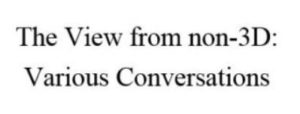
Wednesday July 17, 2013
I spoke to Guidelines at The Monroe Institute. A dozen participants, with Lee Stone and Marinda Holbrook as trainers. I started by calling for a moment for us to set our intent, and then went around asking people to give their name, where they are from, and when they did Gateway. (I was surprised how recently most of them had done it, ranging from early 2012 to the previous week! But one had done his in April 1992, a nearly a year before me.) I told them right off I didn’t want it to be me performing and they being the audience, but wanted it more like a conversation, us thinking together.
I recorded the first hour of our three-hour talk, then my recorder cut out because, unknown to me, the memory was full. (I had needed to erase past recordings after uploading them to the computer, and hadn’t known that. An analogy to the rest of my life, perhaps.) The group’s response to me, warm from the first, seemed to grow even warmer as we went along, perhaps because I told more about myself – more stories – as one thing suggested another. When I thought I had finished, one of the women wanted to know more about me, how I had come to all this, etc. So I told about reading Cayce, and the mescaline trip in 1970, and Dennis and David, and the Shirley MacLaine Higher Self Seminar, and the newspaper story and meeting Bob Friedman, and meeting Bob Monroe and so on. And Lee Stone made a point, at the end, of acknowledging our work at Hampton Roads and my own contributions to the TMI library. (Earlier, he had suggested that I might speak to next year’s Timeline program.)
My emphasis all night was how simple and natural it is to communicate, and I posed the question repeatedly – what are we to do? We are the point of the spear, so to speak, in that maybe 20,000 people have done Gateway. What is our responsibility in these times? I mentioned Jim Marion’s book, and George Ritchie’s. A couple of interesting suggestions. One said, maybe we could go into the past and change certain things (which of course raised the question of how we know what is good or bad). Another was, pull ourselves into a future we want, and I mentioned that I thought Star Trek had done that to some extent, by giving people a more positive future to envision. Someone suggested that we RV the future to see who things work out. (in this timeline, of course, and there’s the rub). A very satisfying evening.
Very good group, very good questions and participation. Little things. I said (seeing them with their new lives all ahead of them) that I envied them, and the one woman said, “We envy you.” Another, obviously sincerely and whole-heartedly, as I was leaving, said, “You’re awesome.” There was a time in my life when I would have paid good money for a comment like that!
The best kind of meeting. Everyone can feel it when it’s going well.